“Opportunities don’t happen. You create them.” – Chris Grosser. This quote shows the heart of entrepreneurship, especially in starting a franchise. For UK entrepreneurs, starting a franchise ownership business in Italy is a unique chance. The Italian franchise sector has grown a lot, with a 9.9% turnover increase in 2023, reaching almost €34 billion.
This article will help us understand the challenges and benefits of starting a franchise in Italy. We’ll look at why the franchise model is good and what legal steps are needed. With LerriHost as our guide, we’ll learn how to succeed in franchise ownership.
Understanding Franchise Ownership in Italy
Starting a franchise in Italy means you have to understand the law well. This is important for both those who want to own a franchise and those who want to offer one. The law makes sure both sides of the deal are treated fairly.
Franchise agreements must be written down, as the law says. This makes things clear and sets out what each side expects. There’s also a rule for franchisors from other countries wanting to start here. It tells them how to go about it.
Assofranchising is a big help in the franchising world. It makes sure everyone acts fairly and honestly. This is key when you’re thinking about owning a franchise in Italy.
Franchisors have to tell potential owners a lot of things before they sign up. This includes money details, trademark info, and any legal issues. If they don’t, they could face big problems, like losing the contract and having to pay damages.
Even though franchisors don’t have to translate everything into Italian, they must give info in Italian if asked. The cost to start a franchise can vary a lot. It depends on the franchise’s size and reputation. Knowing this helps ensure you can afford it and that it will grow.

Key Benefits of Starting a Franchise Ownership Business
Starting a franchise business in Italy comes with many benefits. These are especially good for those with finance, HR, or banking experience. They often have the skills needed for running a franchise.
One big plus is the brand recognition you get. This means customers trust and stick with you, helping you make money faster. You also get lots of help from the franchisor, including:
- Ongoing operational support to streamline procedures
- Training programmes that boost knowledge and confidence
- Access to effective marketing resources that enhance visibility
Franchise owners often thank the franchisor for the training. It makes them more skilled and confident in running their business. Being part of a franchise network also means you can work together and share ideas. This creates a supportive and rewarding environment.
Another great thing about franchise ownership is giving back to the community. Franchisees often help out in local projects, which strengthens their connection to the area. This not only makes them happy but also builds strong customer relationships.
The franchising model also has a proven success track record. This lowers the risk of starting a new business. You get a tested model with systems in place, showing a clear path to growth and stability.
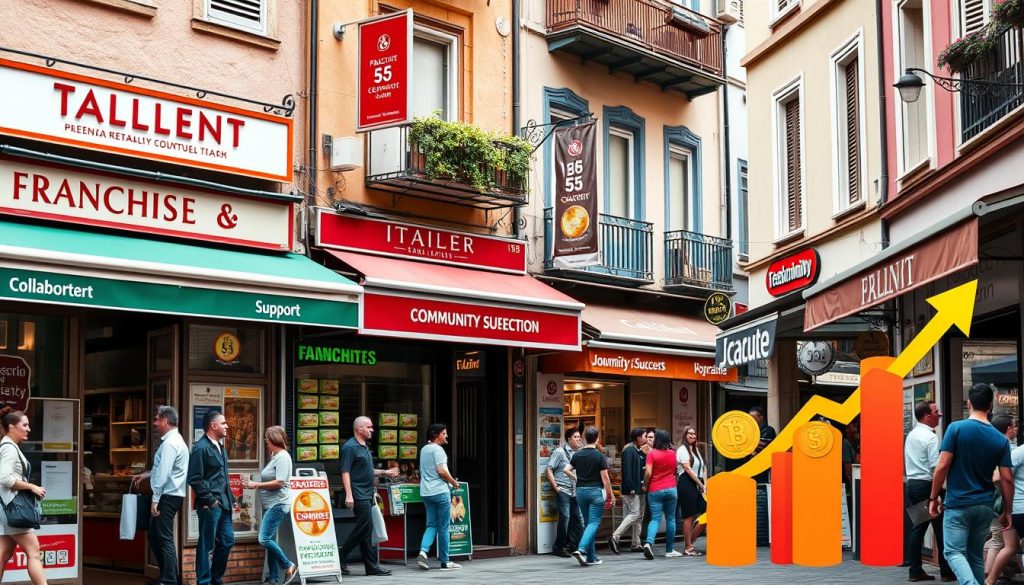
Current Trends in the Italian Franchise Market
The Italian franchise market is seeing big changes. In 2023, the market’s turnover jumped by 9.9%, reaching almost 34 billion euros. This shows franchising is getting more popular among entrepreneurs and big brands.
The number of franchise locations went up by 7.6%. This is much higher than usual. By the end of 2023, there were 65,806 franchise spots. Franchising is now a major job creator, with 287,767 people working in it and 34,919 new jobs added this year.
Looking ahead, the franchising sector in Italy is expected to grow by 4.3% in 2024. Most franchisors are upbeat, with 97% planning to open new spots in the next three years. They’re focusing on smaller stores, especially those under 80 m².
The Food and Beverage sector is leading the way, drawing in many international brands. Digital changes have also influenced how people shop, making online services and hybrid models more sought after. As we look to the future, franchises are focusing on sustainability and catering to eco-aware customers, opening up new opportunities for growth.

Legal Framework Governing Franchising in Italy
The legal rules for franchising in Italy are mainly based on Law No. 129 of 2004. This law sets out the rights and duties of franchisors and franchisees. Knowing these franchise regulations is key for our success in Italy.
One major part of this law is the need for pre-sale disclosure. Franchisors must give detailed info about their business and franchise network before any contracts are signed. This helps ensure that potential franchisees know what they’re getting into, protecting their interests.
Following the law’s rules is also crucial. We must sign franchise agreements in writing to protect our rights and duties. Keeping important documents, especially for tax, is not just wise but often required by law.

Not following these franchise regulations can cause big problems. This includes legal fights and fines. So, it’s very important for us to understand and follow the legal rules of franchising in Italy.
Steps to Launch Your Franchise Ownership Business
Starting a franchise business requires several key steps for success. The first step is to do thorough market research. This helps us find the right franchise in our chosen field. Knowing the market well increases our chances of picking a franchise that fits our goals.
Next, we need to get the money needed for our business. The cost to start a franchise varies a lot. It can be less than $20,000 or more than $100,000, depending on the industry and location. Having a clear budget helps us manage our finances well.
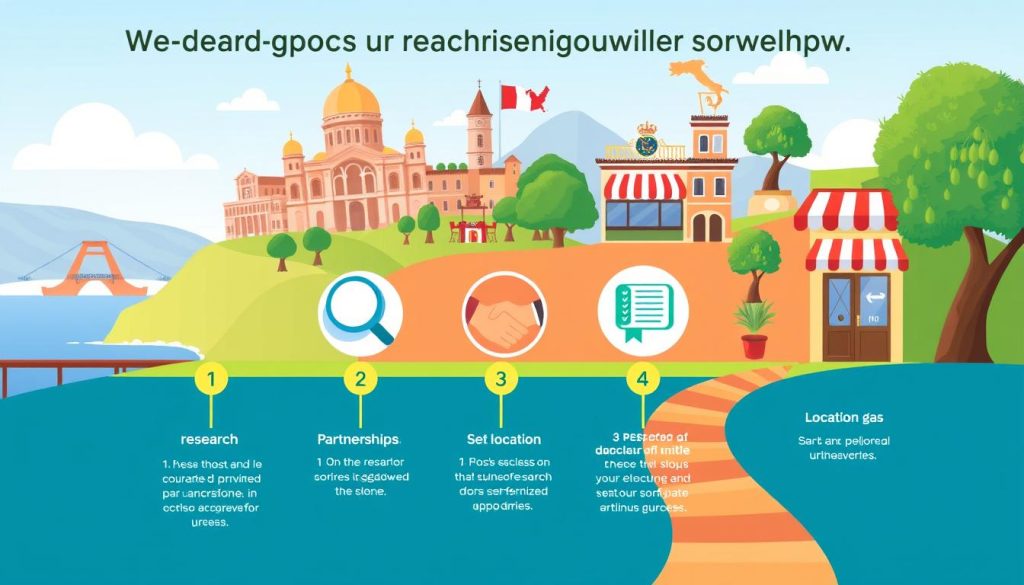
Then, we should work on the franchise agreement. This document includes important details like fees, renewal terms, and performance standards. The Franchise Disclosure Document (FDD) is crucial here. It must be given by franchisors at least two weeks before signing. The FDD has 23 sections, covering key information from franchisor data to performance promises.
The time it takes to start a franchise business can be three to twelve months. This depends on how well we get to know the brand, legal checks, and finding a location. Working with experienced advisors can help a lot. They offer valuable advice and support during this journey.
By following these steps carefully, we set ourselves up for a successful start. This ensures a smooth entry into the world of franchising.
Choosing the Right Franchise Brand
Choosing the right franchise brand is key to success in our business journey. When looking at franchise opportunities in Italy, we need to consider a few things. These include the brand’s market presence, reputation, and the support from the franchisor.
Doing our homework means checking the franchisor’s financial health. It’s also important to understand their operations and growth plans. Talking to current franchisees can give us real insights into the brand’s good and bad points.
As we look for the right franchise brand, we can follow a clear plan:
- Evaluate Investment Levels: Check if the franchise fits our budget.
- Market Evaluation: Look at the franchise’s place in the Italian market and its rivals.
- Franchisor Comparisons: Compare franchisors to find the best support and training.
- Ask Final Questions: Make a list of at least ten important questions to clear up any doubts before we decide.
When we look at franchise agreements, it’s crucial to understand the rules about territories and competition. Having our own territory can help us avoid direct competition. But, too many outlets near each other can hurt our profits.
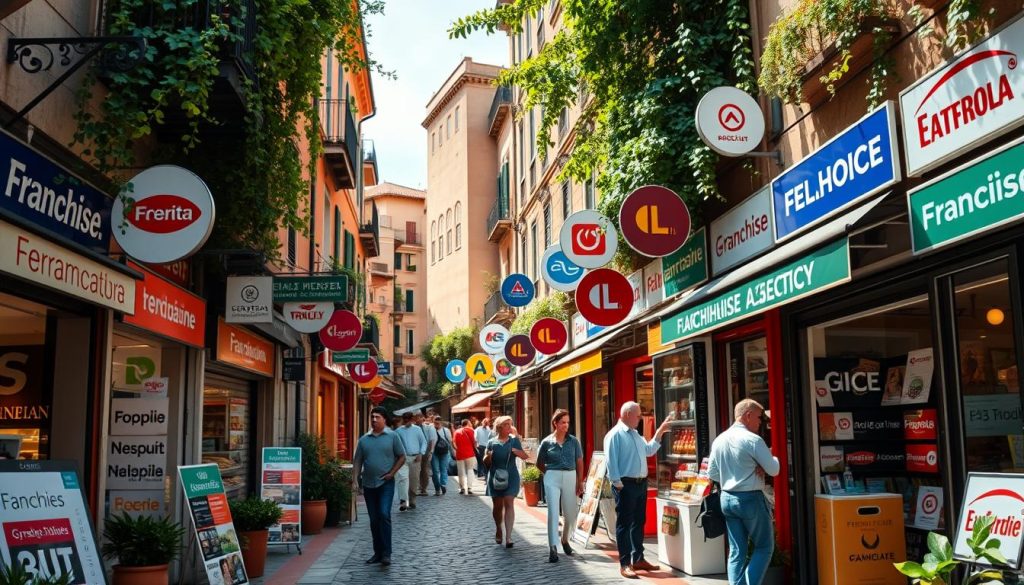
There are many successful franchises out there, like McDonald’s and Costa Coffee. Each one has its own costs, structures, and rules to follow. Being well-informed and careful will help us pick the best franchise brand for our goals in Italy’s lively market.
Franchise Ownership Business: Initial Investment and Return on Investment
Starting a franchise business means facing franchise investment costs. These can vary a lot, from €30,000 to over €500,000. Costs depend on things like brand fees, equipment, and local property expenses. Knowing these costs helps us get ready for the financial commitment.
The return on investment (ROI in franchise business) is also key. On average, franchisees can get their money back in 18 to 36 months. This depends on the brand and the type of business. Fast food and retail franchises often have strong ROI due to their popularity and customer base.
Remember, ongoing royalties are part of the costs. They’re a percentage of sales and affect our ongoing expenses. Franchises have tested business models, which means they’re more likely to make money. The brand’s reputation helps us earn revenue quickly.
Franchisors offer support like training and marketing help. This boosts our chances of making money. Talking to other franchisees in networks helps us share ideas and strategies. It supports our path to profitability and helps us balance work and life.
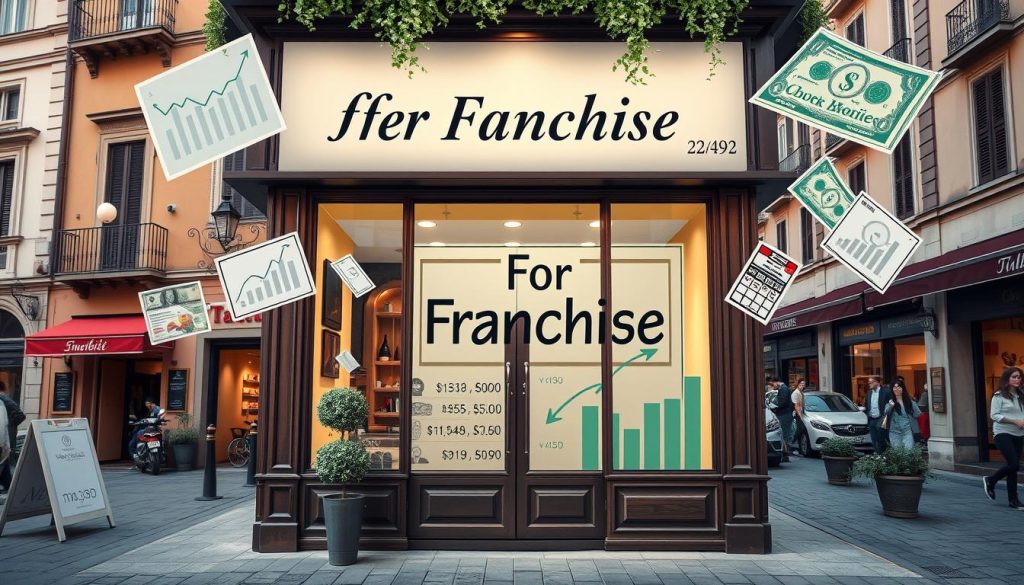
Importance of Pre-Sale Disclosure Obligations
In franchising, knowing about franchise disclosure obligations is key for everyone involved. These rules help build trust and make sure all information is clear. This way, franchisees can make smart choices about their investments.
Italian law requires franchisors to share all the details 30 days before signing any agreements. This includes financial info and details about the network and any risks.
Disclosures are very important. In fact, 85% of mergers and acquisitions need a disclosure letter. Without proper legal obligations for franchisees, mistakes can happen. This can lead to a 21% rise in claims.
Also, not sharing all the facts can lower buyer confidence by 43%. This could risk the success of business deals.
Franchisors have to cover many areas when they share information. These include:
- Pending and prior litigation matters
- Bankruptcies within the last decade
- Initial and ongoing fees associated with the franchise
- Financing terms related to franchise arrangements
- Support services such as training and advertising assistance
- Intellectual property rights such as trademarks and patents
On average, franchisors must share about 23 important things in the Franchise Disclosure Document (FDD). This helps avoid risks and builds trust. With 92% accuracy, negotiations can go smoother.
Following franchise disclosure obligations and knowing legal obligations for franchisees is crucial. It boosts franchisee confidence and keeps the franchising system strong.

Financing Your Franchise Ownership Business
Starting a franchise business requires understanding different financing options. Around 80% of franchisees use bank credit for funding. A solid business plan is key to getting loans.
The financing world for franchises is changing. Challenger lenders and alternative providers offer more options. But, most loans only cover 70% of costs, so we need to find more money.

Some franchisors help with financing or partner with banks. SBA loans have better terms than regular loans. Using retirement funds through ROBS can also help, without debt or interest.
Home equity loans are another choice, but they come with risks. Crowdfunding or partnerships can also help, offering different ways to get funds.
By researching and comparing financing options, we can get the money needed. This is crucial for starting and running our franchise business successfully.
Common Misconceptions About Franchising
In the world of franchising, many myths exist that might stop people from exploring it. It’s important to know these misconceptions about franchising if you’re thinking about it.
One big myth is that franchising means you’ll definitely succeed. But success depends on many things like where you’re located, how well you manage, and the market. No business model can remove all risks of starting a business.
Another myth is that franchising is only for fast-food chains. But franchising is in many areas, like retail, healthcare, education, and real estate. This means you can find something that fits your interests and skills.
- Many think franchising is very expensive. But, while some franchises cost a lot, there are also affordable ones in different industries.
- Some believe you have no control in franchising. But, while you must follow the franchisor’s rules, you can make decisions on local marketing, staff, and operations.
- There’s a myth that you need business experience to franchise. But, many franchisors offer training and support to help you succeed, even if you don’t have experience.
- Some think franchisors do all the work. But, franchisees run the day-to-day, with franchisors providing guidance and resources.
- Another myth is that franchising is a quick way to get rich. But, like any business, it takes hard work, dedication, and perseverance to do well.
Knowing these franchising myths helps us see franchising clearly. Getting the facts helps us make better choices about owning a franchise.
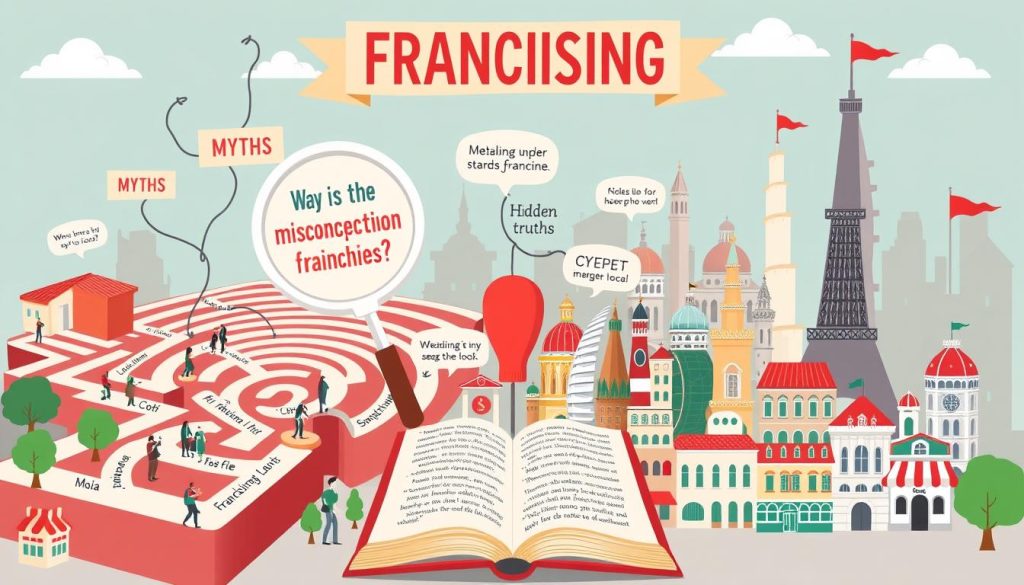
How to Measure Success as a Franchisee
Measuring franchise success needs a detailed plan. We must look at many key performance indicators (KPIs) for the business. These include financial health, customer happiness, how well we operate, and how our employees do.
- Sales Metrics: It’s important to track our monthly sales, the average amount spent by each customer, and how often they come back.
- Marketing Effectiveness: We should check how much it costs to get new customers, how many of them buy from us, and what we get back from our marketing efforts.
- Customer Satisfaction: Keeping an eye on what customers say, their reviews, and the Net Promoter Score (NPS) helps us see if they’re happy.
- Operational Efficiency: Watching our labour costs, food expenses, and how fast we sell and restock helps us see how well we run the business.
- Employee Performance: It’s crucial to monitor how often staff leave, how happy they are, and how productive they are to keep them performing well.
It’s vital to keep things consistent across all our locations. This builds trust and loyalty in our brand. Choosing the right places to open our restaurants is key. We should think about the local population and how easy it is for people to get there.

We also need to be flexible and keep up with market changes and what customers want. Focusing on making customers happy and listening to their feedback is important. This helps us keep them coming back and encourages them to tell others about us.
Keeping a close eye on our finances helps us stay on track. This means checking our income statements, cash flow, and expenses regularly. It also helps us control costs and stay financially healthy. Being actively involved in the franchise can make a big difference. It shows we’re committed to doing well and following the company’s goals.
In short, success in franchising comes from using KPIs to make informed decisions. Understanding what the brand expects and how it operates helps us succeed in the franchise world.
Adapting Your Franchise to Italian Consumer Habits
To succeed in Italy, we must adapt our franchise to local tastes. Understanding what Italian consumers want is key, especially in Food and Beverage. Here, quality and authenticity are top priorities. By matching our offerings to what locals like, we build a stronger bond with the community.
Studies show that franchises in Italy that do their homework before opening are 20% more likely to hit the mark. This preparation helps us align our products with what people in the area enjoy. It’s essential to get to know the local customs.
We can make our marketing more appealing to Italian culture. For example, using video marketing can boost our visibility by 25%. Tailoring our ads to reflect local values helps us win over potential customers.
Also, teaming up with locals is crucial. Joining in community events or groups can build trust and loyalty. As we adapt, we’ll find more success in Italy.

Working with Franchisors in Italy
Our relationship with franchisors is key to our success in Italy. A good partnership is crucial. We must talk openly about how things work, any problems, and new chances.
This clear talk helps us both know our parts in the deal. It makes sure we work well together.
Many franchisors in Italy give a lot of franchisor support. This support includes training, marketing plans, and help with running the business. Working together lets us use their knowledge to improve our business.
In the hospitality world, franchisors guide us through tough market issues. The hotel franchise market is growing fast. Most new hotels are part of big brands, thanks to franchise deals.
Franchisees pay a fee of about 4% and give 8% to 12% of their earnings to franchisors. This shows how important a good partnership is. Both sides do well when things are clear.

Franchise deals help us manage our business better. This can save a lot of money, which is good for keeping profits up. Working with franchisors who help a lot is very helpful in the competitive franchise market.
By focusing on our relationship with franchisors and using their help, we create a win-win situation. This benefits both the franchisees and the franchisors.
Marketing Strategies for Your Franchise Business
Creating effective marketing strategies is key to growing your franchise. We need to focus on local ads, digital marketing, and engaging with our community. This approach boosts our brand’s visibility to our target audience.
Many franchise owners now see the decline of traditional marketing like TV ads. In fact, 42% say these methods are not worth it anymore. Instead, using social media is crucial. It reaches 3.5 billion users worldwide, making it a powerful tool.
Getting involved in local events is also important. It helps build positive relationships and increases brand recognition. Since 71% of consumers prefer known brands, this is vital. Also, personalising customer experiences can boost sales by 80%.

SEO is essential, as 90% of consumers search online before buying. Paid search ads and video marketing can significantly increase brand awareness. Interactive marketing can also lead to a 70% increase in conversions.
It’s important to keep an eye on how our marketing is doing. We should track engagement, feedback, and success. By using digital and local strategies, we can grow our franchise in a competitive market.
Networking and Support Groups in the Franchise Community
Networking is key to our success in franchising. By joining support groups, we meet other franchisees and experts. This sharing of knowledge helps us grow.
Organisations like Assofranchising give us access to many resources. They help us learn and support each other through tough times.
Going to industry events keeps us up-to-date with new trends. These gatherings offer chances to learn from others and find new solutions. Sharing our experiences helps us discover new ways to succeed.
Groups like the Federation of Small Businesses (FSB) offer valuable support. They help with legal advice, cyber protection, and tax issues. Enterprise Nation and Small Business Britain also boost our confidence and growth.
Platforms like BNI help us network globally and locally. The Athena Network supports women in business. Meetup.com hosts groups like Entrepreneurs in London, helping us connect.

Future Outlook for Franchising in Italy
The future of franchising in Italy looks bright. The Italian economy has shown great strength. Changing consumer tastes are set to boost the franchise market a lot.
The Food and Beverage sector is expected to grow fast. This is because people want better quality and sustainable options. Veeno, for example, saw a 53% increase in sales in 2021 compared to 2019.
Franchising trends show that customers are getting smarter. They want to know more about what they buy, like wine. Veeno, focusing on quality and great customer service, is well-placed for success.
The franchise model needs to be flexible to keep up with changes. Franchisees should be ready to try new things and help with brand growth. This will help them stay ahead.
There’s also a big chance for growth outside Italy. Markets like the UK, UAE, and Asia are showing interest in franchises like Veeno. This means a strong future for franchising in Italy, especially for those who can adapt.









